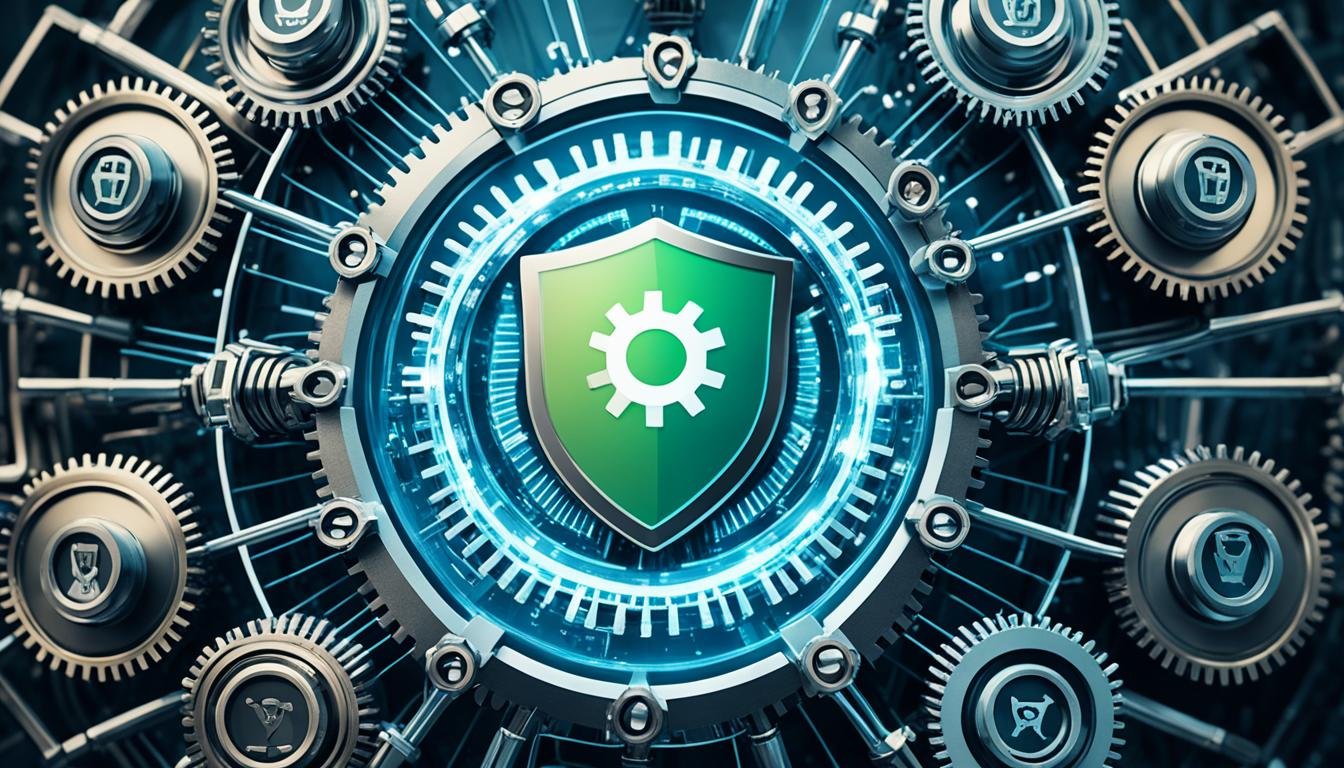Building a Cyber Resilient Business in Ireland
By 2030, the cyber security field in Ireland could employ 17,000 people. It might also add €2.5 billion yearly to the economy. Right now, more than 7,300 workers are in almost 500 companies. They’re making €1.1 billion each year. This fast growth shows the need for strong cyber resilience.
Denis Ryan from NSAI says we must boost our cyber resilience, especially in October during European Cyber Security Month. Cyber attacks against firms are rising. So, businesses must make cybersecurity in Ireland a top issue. This means tackling ransomware and teaching workers to stay safe online. It also means keeping important data safe with encrypted backups. Doing these things can protect companies from losing money and damaging their good name.
Key Takeaways
- Cybersecurity in Ireland is forecasted to employ 17,000 by 2030, adding €2.5 billion yearly.
- There has been a three times increase in cyber security jobs from 2019 to 2022.
- It is key to handle ransomware threats to boost business cyber resilience.
- Training employees to be alert and backing up data securely are vital parts of good cyber resilience strategies.
- Initiatives by the Irish Government, like the National Cyber Risk Assessment, show the importance of data protection regulations in Ireland.
The Importance of Cyber Resilience for Irish SMEs
Irish SMEs are vital, making up 99.8% of businesses. The need for better cybersecurity in Ireland goes beyond technical issues. As we observe European Cyber Security Month in October, we must see how important cyber resilience is for our society and economy.
Societal Impact
Good cybersecurity helps make society stronger. It protects important infrastructures and keeps personal data safe. After Estonia faced a cyber attack in 2007, it greatly improved its cybersecurity. This made the country more secure and created trust in digital systems.
Estonia even offers many courses to teach people about cybersecurity. This helps everyone be aware and less vulnerable to cyber attacks.
Economic Impact
The effect of strong cyber resilience on the economy is huge. Without it, data theft and service problems can cause big money losses. They can also harm a company’s name and its bottom line.
But, companies that focus on cyber risk can avoid these problems. They can even stand out from their rivals. Getting ISO/IEC 27001 certification is a step in the right direction. It’s a big deal for cybersecurity and meets the needs of big clients.
Also, new EU rules are on the way to make businesses more cyber secure. The government of Estonia puts money into cybersecurity, showing its importance for a steady economy. By following the guidance of the National Cyber Security Centre, Irish SMEs help make the economy safer and stronger.
| Factor | Impact |
|---|---|
| Data Theft | Causes significant financial losses and damages reputation |
| ISO/IEC 27001 Certification | Facilitates international scalability and compliance |
| European Cybersecurity Directives | Strengthens cybersecurity requirements, reducing economic risks |
Future-proofing Your Cybersecurity
Securing your business’s future from changing cybersecurity threats needs a proactive, varied approach. The EU Cyber Summit 2024 will gather over 1,000 people from around the world for two days. It includes 50+ experts and solution providers. The summit offers three streams for discussing different aspects of cybersecurity.
Businesses should focus on training their IT teams and including security in change management. This helps protect against new cyber threats. The summit’s workshops, like the DORA one, offer insights for the financial sector. They understand how systems can deal with disruptions. The GDPR workshop specifically looks at handling personal data under GDPR rules.
For effective cybersecurity, businesses need to take key steps:
- Stay updated by regularly patching systems.
- Keep tested backups ready.
- Train staff about cybersecurity awareness.
- Have a detailed incident response plan.
- Use strong cybersecurity measures at different levels.
The NIS2 workshop focuses on EU-wide cybersecurity regulations. It aims to strengthen network and information systems. The EU Cyber Resilience Act and the EU Cyber Security Act workshops set new standards for digital product security and unified cybersecurity rules.
Business leaders play a crucial role in making cybersecurity a priority. Their active engagement helps expert teams fight cyber threats effectively. The UK’s NCSC offers CEOs important advice on boosting cybersecurity. Their help allows businesses to better protect themselves against cyber attacks.
Key Cyber Resilience Strategies for Irish Businesses
Cyber resilience is vital for Irish businesses today. With almost all enterprises being SMEs, it’s clear robust cybersecurity is a must. We highlight three top strategies: defending against ransomware, training employees, and using encrypted backups.
Ransomware Defense
Ransomware is a major threat to SMEs in Ireland, with attacks happening every 11 seconds worldwide. Using strong ransomware defense is key to lower this risk. It’s advised to use several methods, like scanning for vulnerabilities and managing updates regularly. The Dell GDPI survey showed 91% of organizations are looking into a ‘zero trust’ approach, which improves resilience.
Employee Awareness Training
By 2025, human mistakes could cause more than half of big cyber incidents, according to Gartner. Because of this, teaching employees about cybersecurity is crucial. Training helps them spot and avoid phishing, keeping your company safe. 86% of Irish executives stress the importance of employee education in keeping the company secure.
Encrypted Backup Systems
With remote work, the risk of losing data has gone up, say 70% of IT leaders. Having encrypted backups is crucial. They protect against data loss and ransomware. Yet, only a third of Irish companies have a solid plan for cyber emergencies. Using encrypted backups not only makes your data safer but also builds trust with customers.
The Role of Data Protection Regulations in Ireland
In today’s digital world, it’s crucial that companies in Ireland follow strict data protection laws. As more personal information is used and saved, the risk to this data grows. So, businesses need to be very careful.
These laws make sure companies do the right things with your information. They help build trust with customers and other companies. This trust is vital for business success today.
Compliance with GDPR
To operate in the EU, companies must follow the GDPR. This includes measures to protect data from risks. Companies must do things like:
- Pseudonymization and encryption of personal data
- Ensure data systems can always be used and are strong
- Make sure data can be accessed again fast if something goes wrong
- Test and check the security of systems often
Companies also need to teach their staff about these security steps. And everyone in the company must follow them carefully.
Upcoming EU Directives
Besides the GDPR, Irish companies must get ready for new EU rules on online security. A directive called NIS2 will affect many businesses in the EU. It highlights the importance of stronger online security through working together.
It’s essential that companies keep up with new security rules. This will help them protect against online threats better.
| Statistics | Percentage |
|---|---|
| Faced cyber incidents in the last three years | 46% |
| Experienced data breaches | 30% |
| Reported incidents to regulatory bodies | 14% |
| Conduct regular cybersecurity training | 57% |
| Perform risk assessments | 44% |
| Employ a multi-layered defense strategy | 38% |
Building a Cyber Resilient Business in Ireland
Creating a Cyber Resilient Business in Ireland is crucial. It helps businesses grow and follow global cybersecurity rules. Yearly, more money is put into cybersecurity as threats and defense tools advance.
In 2022, cybercrimes cost the Irish economy €630 million. 82% of businesses faced a hack last year. This shows strong security is needed. Over 43% of small companies are attacked, so CFOs must wisely invest in security and other financial tools.
CFOs and CISOs work together to manage spending and risk from cyber events. They must figure out the company’s risk tolerance for good security planning and budgeting. With GDPR, non-compliant companies face huge fines. Following the PCI DSS standard also protects finances and makes customers feel secure.
41% of Irish companies have been attacked recently. The Hiscox Cyber Readiness Report of 2023 shows a 71% cyber attack rate, up 22% from the year before. This proves the need for ongoing investment in cybersecurity.
Adhering to worldwide cybersecurity standards, like ISO/IEC 27001, protects opportunities worldwide. CFOs need to grasp the financial risks of cyber events. They should balance spending on security tools and essential security initiatives.
The National Cyber Security Strategy and related laws like the European Union Regulations and the Cyber Resilience Act set resilient digital standards. These rules help Irish businesses stay prepared against constant cyber threats.
| Cybersecurity Aspect | Details |
|---|---|
| Financial Impact | €630 million in Irish cybercrime costs in 2022 |
| Compliance | GDPR fines up to €20 million; PCI DSS builds customer trust |
| Business Scalability | Adherence to ISO/IEC 27001 enhances international opportunities |
| Cyber Attack Statistics | 71% of Irish businesses attacked in the last year |
| Preventive Measures | 80% of cyberattacks preventable by timely updates |
Business Continuity Planning and Incident Response
In our fast-changing online world, business continuity planning and incident response planning are key. Many Irish businesses, about X%, had cyber troubles last year. Shockingly, just Y% of organizations have a solid response plan, and only Z% have checked their plans recently.
In brighter news, more Irish companies are getting better at cybersecurity, with an A% increase from last year. But, even with this improvement, there’s been a D% jump in ransomware attacks.
Looking closer at the numbers, some serious troubles stand out:
| Statistic | Percentage |
|---|---|
| Businesses experiencing cyber incidents | X% |
| Organizations with formal incident response plans | Y% |
| Tested incident response plans | Z% |
| Increase in the adoption of cybersecurity practices | A% |
| Companies with cyber insurance coverage | B% |
| Primary source of cybersecurity incidents (Phishing) | C% |
| Rise in ransomware attacks | D% |
Phishing attacks, named by C% of organizations, are the top cyber issue. They cause the most harm, along with natural disasters. This highlights how important it is to be ready for any problem, big or small. Sadly, many companies are not ready, their plans too old or never tested.
As businesses use more tech and global connections, the risk of big problems is up. So, it’s key to build ways to bounce back, do good risk checks, and teach staff about what to do in an emergency. Getting things ready before bad stuff happens is how companies make it through tough times. A focus on risk and planning helps them do well even when things go wrong.
Finally, being ready with a strong business continuity plan and updated incident response plan is vital for strong cybersecurity. This keeps companies safer and more ready for the future.
The Value of Cybersecurity Certification
The world of cyber threats is always changing. This means companies must have strong security measures. Certifications like ISO/IEC 27001 show that a company is serious about keeping data safe.
ISO/IEC 27001 Standard
ISO/IEC 27001 sets a method for handling security risks and keeps companies following laws. It’s known worldwide. This certification helps protect important data from attacks and leaks.
Benefits of Certification
Getting certified in cybersecurity brings many advantages. It lowers the chances of data breaches and financial losses. It also builds trust with clients. Plus, it makes a company stand out as one that really values cybersecurity.
Steps to Certification
Getting certified in cybersecurity involves several key steps:
- Initial Assessment: This step checks current security setups and spots where they can be better.
- Implementation: Companies set up and use security rules that fit ISO/IEC 27001.
- Documentation: They make documents and rules needed by ISO/IEC 27001.
- Internal Audit: Internal checks are done to make sure everything meets the standard.
- Certification Audit: Finally, a certified group looks at everything to give the official stamp of approval.
Choosing a cybersecurity certification can secure a company against attacks. It proves to others that the company really cares about keeping digital info safe.
As per the 2021 (ISC)2 Cybersecurity Workforce Study, we need over 2.72 million more cybersecurity workers globally. And we must grow our cybersecurity team by 65% to protect critical information effectively.
Being part of a cybersecurity certification process, like ISO/IEC 27001, helps businesses face these challenges. It makes for a safer digital future.
| Step | Description |
|---|---|
| Initial Assessment | Evaluate existing security practices and identify areas for improvement. |
| Implementation | Develop and apply security controls aligned with ISO/IEC 27001 standards. |
| Documentation | Create necessary documentation and policies. |
| Internal Audit | Conduct internal audits to ensure all procedures are in place. |
| Certification Audit | Engage an accredited certification body for the final audit. |
Cyber Risk Management for Irish Companies
Irish companies are dealing with a changing cybersecurity threat landscape. They need strong cyber risk management strategies. More than 90% of Irish businesses are working on strategies to handle cyber risks. This is according to Aon’s Global Risk Management Survey. Having a plan like this is very important. This is because cyber attacks and data breaches worry organizations the most.
In 2022, 18% of Irish firms saw a cyber attack or data breach. The odds of this happening are different for big companies and small to medium ones. For example, 21% of big firms got hit, but only 9% of small to medium ones did. Keeping digital security strong is crucial. A successful cyber attack can cause a company’s value to drop by 9% in the next year.
Many companies are now focusing on being strong against cyber threats. About 67% of Irish businesses plan to spend more on cyber security soon. This number rises to 71% for bigger companies. It shows how important it is to have good cyber risk management strategies.
To be strong against cyber threats, there are key steps businesses are taking. About 38% improved their ways to recover and back up data. And 35% gave their employees training on cyber security. These efforts are key for a safer digital workplace.
Aon’s Cyber Loop model is important for handling cyber risk management. It has four steps: Assess, Mitigate, Transfer, and Recover. Using this model helps companies get better over time. It helps them find and fix weak spots.
Irish companies get that digital security is crucial for their business, not just a tech issue. The need for cyber security experts has tripled from 2019 to 2022. This shows the sector is growing. Analysts believe the cyber security market will keep growing. They say it could become worth many billions of dollars.
Focusing on cyber risk management can help Irish companies a lot. It can protect what matters, strengthen their value, and face the changing cybersecurity threat landscape well.
“The goal isn’t to eliminate all cyber risks but to build a resilient framework that can withstand and recover from cyber threats efficiently.”
The Role of Cloud Security Measures
Businesses in Ireland are turning to online operations more than ever. Cloud technology offers effective security for customer data. It’s essential because of the high number of cyber attacks in the country.
Benefits of Cloud Security
Cloud security reduces the risk of data breaches and tailors protection to suit each business. This is critical, as many organizations face multiple breaches each year. Customizable security is a key advantage.

In Ireland, the tech sector employs many cybersecurity experts who benefit from cloud security. These solutions help companies comply with local and EU data protection laws.
Implementing Best Practices
Using the best cloud security measures is important for strong protection. Ensuring data is encrypted and managing who can access it helps keep it safe. Many cloud users follow these practices more than non-users.
Creating a company-wide focus on cybersecurity awareness is also crucial. Training staff in cloud security best practices reduces risks. This effort is important as technology evolves, and threats with it.
The following table illustrates the comparison between cloud-powered and non-cloud-powered organizations in adopting best practices:
| Metric | Cloud-Powered Organizations | Non-Cloud-Powered Organizations |
|---|---|---|
| Adoption of Leading Practices | 65% | 25% |
| Improvement in Cyber Posture | 53% | 34% |
| Focus on Building Cybersecurity Skills | 48% | 39% |
Cloud security is key to keeping customer data safe and operations resilient. By following the best cloud security practices, Irish businesses can protect against cyber threats.
Conclusion
Making a business cyber-resilient in Ireland needs a focus on ensuring data safety and following strict regulatory compliance. The National Cyber Security Centre (NCSC) started in 2015, helping the government improve cybersecurity. The NIS2 Directive, which broadens its scope and adds stricter rules, shows it’s vital to keep up with laws.
Today, cybercriminals and even governments pose bigger risks, meaning companies must watch out. In 2022, the global cost of a data breach hit $4.35 million. Sectors such as finance and insurance have seen a 38% rise in ransomware cases. This proves that security is not just about tech; it’s a strategic decision. Companies must heavily invest in security tools like multifactor authentication (MFA), which became more popular in the U.S. in 2022.
The National Cyber Risk Assessment 2022 says businesses must check supplier risks to avoid outside interference. Following advice from groups like the European Union Agency for Cybersecurity and the National Institute of Standards and Technology helps a lot. The future safety of Irish businesses depends on their ability to tackle new threats, use strong cybersecurity, and meet strict rules. This will make sure their operations thrive in the digital era.
Source Links
- Cyber Ireland unveils ambitious roadmap to drive Cyber Security sector growth by 2030
- Ireland ICT Building Digital Resiliency Key Focus for Irish Industry and Government
- Creating a Cyber Resilient Culture in Your Organisation
- Improve your company’s cyber-resilience | NSAI
- Learnings for Ireland from Estonia’s Leadership in Cyber Security – Cyber Ireland
- What are the main cyberthreats facing companies right now?
- EVENT: EU Cyber Summit 2024
- Protecting Your Business – CEOs Guide to Responding to Cyber Incidents
- Future-proofing the UK’s cybersecurity: Expanding the NCSC Ten Steps.
- Cyber security 101 for Irish businesses – TechCentral.ie
- Cyber trust insights 2022
- Data Security Guidance | Data Protection Commission
- Navigating the Cybersecurity Landscape in Ireland: 2023 Insights and Actions
- Data Protection, Privacy and Cyber
- Building a Cyber Resilient Business | Security | eBook
- Cybersecurity for Businesses in Dublin, Ireland: Essential Strategies
- Engaging the Board to Build Cyber Resilience – CommSec Cyber Security
- Business Continuity | IT Governance Ireland
- Business Continuity Plan | Disaster Recovery Northern Ireland
- What Are The Best Practices For Business Continuity Planning? – Arbelos
- Cyber Security Vision for Ireland 2022.
- Cyber4AM highlights the need to fortify digital defences for Ireland’s manufacturing industry to maintain its global edge – Cyber Ireland
- Aon’s Latest Global Risk Management Survey Reveals Cyber-Risk is Top Concern for Businesses in Ireland
- Aon’s Survey Finds One in Five Firms in Ireland Experienced a Cyber Attack Last Year
- Cyber Ireland unveils ambitious roadmap to drive Cyber Security sector growth by 2030
- cybersecurity-bdo-human-touch
- Leading with security: Cloud-powered businesses make security a priority
- Strengthening Ireland’s cyber resilience | Eolas Magazine
- To Combat Cyber Risk, Businesses Invest in Resilience
- RDJ LLP | Recent Developments To The EU’S Cyber Resilience Framework








